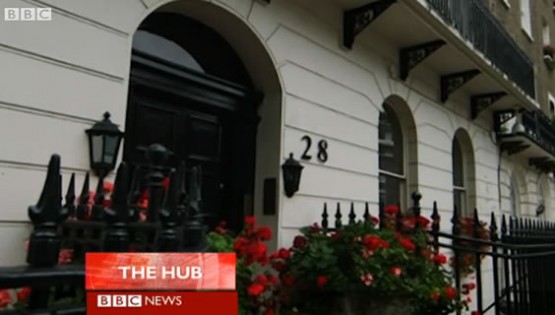
BBC stirred a small storm with a documentary accusing the UK government of failing in its commitment to freeze the Mubaraks’ assets.
The documents the BBC Arabic team produced show that there had been no freeze placed on the multi-million pound UK home of former President Hosni Mubarak’s son, Gamal Mubarak, which is a breach of the UK’s promises to Egypt.
The documentary starts off by asserting that the documents used in the investigations are all publicly available and “reveal property and companies linked to key figures in the Mubarak circle that have been unaffected by sanctions,” the BBC says. Experts on the documentary and officials from the Egyptian government wonder how the UK government failed to track down those assets although they had been fairly easy to track down by the BBC team.
Daniel Tetlow, senior producer and director of the film, told Egypt Today that the investigations took about eight months. The team included Tetlow and five others, including former Business Today and Egypt Today writer Osama Diab.
Not so hidden assets
Although the UK had accepted requests from Egypt to trace and freeze former regime’s assets, the BBC team found various assets that have been missed by the British authorities.
Tetlow says that all of the documents were found in publicly accessible sources. “They were found in the UK Land Registry which allows anybody online, for £4 [LE 38.8] per property, to see the ownership details of any property in the country and the amount paid for the property,” he told Egypt Today. “The companies were found on the Companies House Register online, which, for £1 [LE 9.7] per company, allows you to see the company owners and accounts of any existing or previously existing company in the country.”
When we asked him how easy it would have been for the UK or the Egyptian government to locate the same evidence the BBC team was able to find, Tetlow simply said “A 20-minutes search online.”
Most significantly, the investigations have shown a property in the upscale area of Belgravia, off Knightsbridge in London, worth between £8m and £10m (LE77.5 million to LE97 million) in the name of Gamal Mubarak. The house was not subjected to any freeze and Mubarak has been using it as his address up until 2010 where he listed it as the address on his daughter Farida’s birth certificate.
Although the house is registered to a company in Panama, Gamal Mubarak is named the beneficial owner, which in international practice mean sanctions should have applied.
The BBC has also found, using the publicly accessible Companies House register, a company registered in the name of former housing minister’s wife, Naglaa Al-Ghazaerly. Al-Ghazaerly’s name has been on the sanctions’ list since April 2011 and her assets were ordered to be frozen, and yet the company was registered in her name in November 2011.
Records have also shown that Midinvest Associates, a company co-founded by Gamal Mubarak, continued operations until it dissolved voluntarily in February 2012, 11 months after sanctions against Mubarak were imposed.
The blame game
Assem El-Gohary, head of the Illicit Gains Authority, told the BBC that the UK government isn’t cooperating with the authority to recover the assets and is asking the Egyptian government to acquire evidence on its own, something El-Gohary says is impossible to do without the UK’s help.
“The British government is obliged by law to help us. But it doesn't want to make any effort at all to recover the money,” El-Gohary told BBC. “It just says: 'Give us evidence.' Is this reasonable? We are in Egypt, looking for money in the UK."
The Egyptian government has accused the UK of failing to cooperate with them to recover and freeze the wealth of former regime’s figures and of “hiding stolen wealth and breaching international anti-corruption accords.”
In turn, the UK government said it has exerted all the efforts it can to trace the funds but cannot freeze or recover any assets without the relevant criminal convictions. Foreign Secretary William Hague has told the parliament three days after the release of the documentary that the UK will answer the Egyptian government’s request to freeze the assets of former regime’s figures.
"It is crucial that the recovery and return of stolen assets is lawful,” Foreign Minister for Middle East and North Africa, Alistair Burt said. “It is simply not possible for the UK to deprive a person of their assets and return them to an overseas country in the absence of a criminal conviction and confiscation order."
Britain and the EU applied the sanctions after 37 days, which the Egyptian government claimed were long enough for the accused officials to move their money elsewhere. But Burt responded saying the UK could not have acted more quickly as the request of freezing assets was based on suspicion alone.
Tetlow says the problem is that the British government isn’t clear about asset freezing legislation. “It needed Ahmed Saad from the Asset Recovery unit of the Egyptian ministry of justice to remind the British Treasury of their obligations to make their own investigations in a meeting in London in May 2012,” Tetlow added. “They need evidence, but don’t need criminal convictions to freeze assets. Freezing does not mean returning assets, freezing is just to stop the money moving to then be able to investigate the source.”
The UK has frozen assets of the Mubarak family worth $135 million (LE 823 million). To day, Tetlow says, only $5 billion (LE 30.5 billion) of stolen assets have ever been returned worldwide.
Tetlow concludes that he doesn’t believe the British government are trying to prevent the money from returning to Egypt, they are just not making sufficient efforts to do so. “The Egyptian delegation may be better getting further information from the BBC Arabic investigation team than from the British government,” Tetlow says. et



